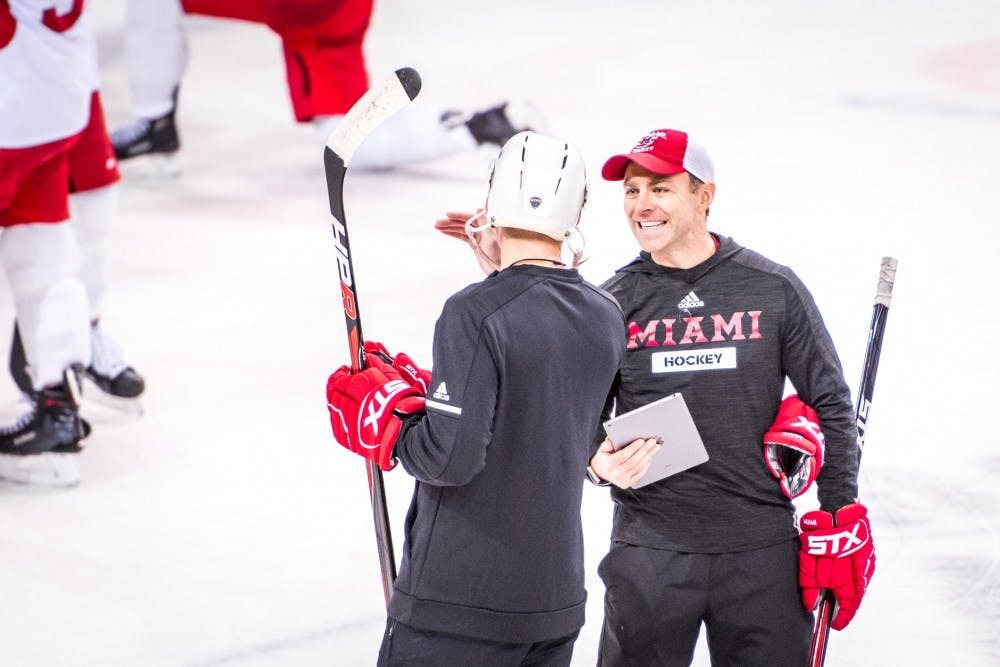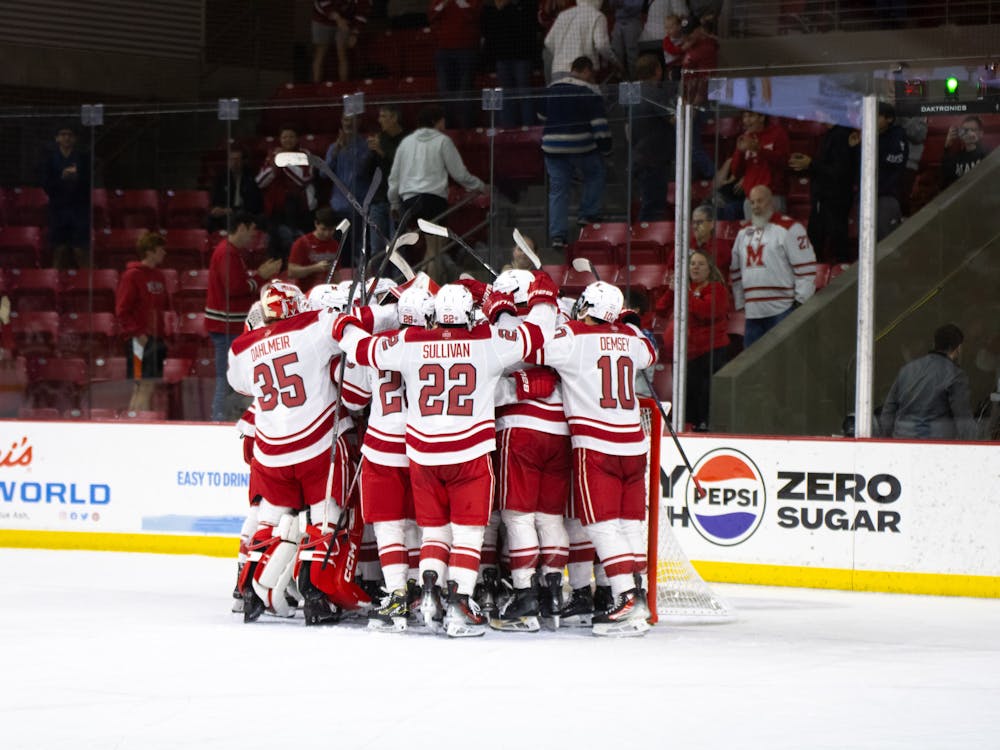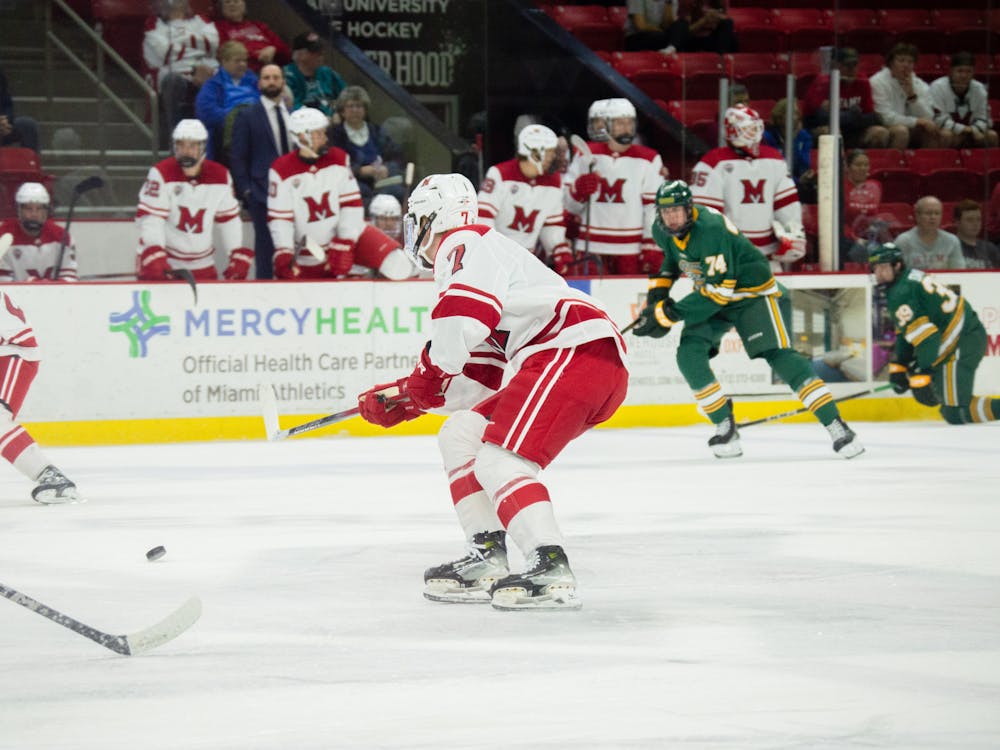Ben Eaves will always be a hockey player. He may sit at his desk above Miami hockey's weight room as a student, on a medicine ball leading a workout as a coach or on press row watching a game as an analyst, but Eaves will always be a hockey player.
"It's almost like your first sweetheart, your first love," Eaves says. "You know it's never going to last forever, but you just have the fondest memories and you know it's a great experience of your life."
But then, of course, hockey players stop playing hockey.
Eaves, 35, is now Miami University Hockey's Director of Human Performance and Wellness, a title that he even recognizes as too regal and very fancy. Eaves works with players in the gym and on the ice as a development coach. He says he's always learning and reading about teaching college players how to play the game they love.
Eaves has hockey in his blood. His father Mike, former center for the Minnesota North Stars and Calgary Flames, is the head hockey coach at Olaf College. His younger brother Patrick, now in his 12th season in the NHL, plays right wing for the Anaheim Ducks. And his mother, Beth, has always supported Ben's love of hockey.
As a high school senior at Shattuck-St. Mary's Prep in Minnesota, he helped his team to its first national championship in 1999. He played at the hockey powerhouse that is Boston College, then was was drafted in 2001 by the NHL's Pittsburgh Penguins. He landed in the American Hockey League and the Finnish Elite League.
Then, in 2010, after nine years as a pro, a severe concussion knocked him out of the sport. It took 16 months to recover.
If he was going to stay in hockey, he would have to make the difficult transition from player to coach.
"I still think like an athlete," Eaves says. "I'm finding that balance between athlete and coach. For me, I don't ever forget what it's like to play and how hard it is."
He speaks of this and holds your gaze with his blue eyes, leaning back in his desk chair. Floor to ceiling windows are to his left and sport psychology and biology books are stacked on various corners of his desk.
"When I ask them to do something, I make sure [the players] know that I've done this recently, or I've done this in the past, or this is what the science says behind it," Eaves says.
Eaves starts his day with a workout at 7 a.m. and then will organize Miami hockey into groups with exercises intended to focus on specific muscles. Eaves regularly dedicates part of his day to reading the latest sport journals and articles in an effort to better serve his players. His quiet office space is disturbed when his players enter the weight room in the afternoon, only a staircase below his desk and extra jump boxes that serve as desk chairs.
Enjoy what you're reading?
Signup for our newsletter
His light-hearted work space is a reflection of his uplifting personality, though Eaves takes his job seriously. Mondays and Tuesdays, he attends the coaches' meetings and intently watches tape comparing second halves of shifts to first halves, analyzing players' movements and bodily limitations and noting every individual player's strengths and weaknesses.
Eaves breaks down his job like he breaks down the tapes.
"When I look at these boys, I can see them as hockey players," Eaves says. "I can assess their skill sets, the way they think the game, the way they process the game. When they come in here, that's the foundation for how I want to work with them."
Eaves recognizes that his contribution to the team is a small one, but one he hopes is important. His passion doesn't go unnoticed by his players.
Freshman forward Phil Knies values Eaves' perspective as a coach, but also his perspective as a former student-athlete. Knies played junior hockey in the United States Hockey League for two years before coming to Miami and notes the biggest change has been balancing school and the Division I hockey schedule.
Because of increased access to fitness facilities and coaches such as Eaves, Knies has noticed an increased fitness level since playing at Miami. Eaves is careful not to push his players to their limits, but asks them every day for 100 percent.
"I think that's been the biggest thing he's taught us - how to be good every day and how to continuously be able to reach peak performance," Knies says.
Eaves touches on this when explaining his weekly routine. His workload lightens towards the end of the week, as he prepares players for game days. When Friday and Saturday arrive, he hopes that his conditioning in the weight room and skill development on the ice pays off.
Eaves knows how important it is to go on the ice feeling ready.
"As an athlete, I know how fragile your confidence can be game-to-game, week-to-week and I just want them to know that I'm going to be a foundational rock for them," Eaves says. "I'll be honest with them, but I'm rooting for them. I'm going to do everything in my power to make sure they're in a good spot to go out and have success on the weekend."
Eaves' has a Bachelor's Degree in English from BC and Master's in Kinesiology from Minnesota, as well as certification as a National Strength and Conditioning Coach. For all his expertise, Eaves still considers himself a hockey player and draws his credibility from his authenticity. Half of his mouth pulls into a grin when he explains he's still a hockey player - the mindset shift from player to coach, from athlete to academic hasn't happened because it won't.
"Coaching sucks compared to playing. Playing is so hard, it's so fun," Eaves says. "You don't even want to compare the two because they're on such different ends. You just hope, as a coach, you can have a positive influence on boys and help them find their best game."
Senior defenseman Grant Hutton agrees with Knies. In previous years, Miami's performance and wellness coach couldn't understand what varsity athletes experience on a day-to-day basis. And, when it feels like work, Eaves tries to remind the players that it isn't.
"We see his positive energy, whether it's in the weight room or on the ice. He's one of those guys who can brighten your day when you walk in," Hutton says. "If things aren't going well he'll be the first guy to speak up and say, 'Hey, we're going to play hockey today. You have a job and it's pretty frickin' fun.'"
And when a player has a day when he doesn't love his job, Eaves is there.
"He's very consistent, that's what we love about him. He doesn't have any bad days and if he does, he does a really good job of hiding it," Hutton says. "You walk in the weight room and he's always got music playing. He's always coming up to you and saying hi and asking how your day's going. He just says, 'Let's get to work.'"
When Eaves isn't working he likes to road bike, explore Cincinnati and convince his coworkers to play him in tennis, ping pong and badminton. He spends free time with his girlfriend and, whenever he can, he visits his mom, dad and brother.
The only time Eaves spoke with greater fondness of something is when he spoke about his family. His warm smile wasn't wider but softer.
His favorite hockey memories? Playing two years of college hockey with his brother and coaching alongside his father at Olaf College last year. His favorite professional hockey team? Whatever hockey team his brother plays on.
"Ben was a great kid. Adapted to everything," mother Beth Eaves says. "To this day, he loves to learn. I have not met anybody who has a mind like his."
Ben Eaves learned to adapt to different places, different cultures and different languages as his family's 25 moves took him all over Minnesota, into Canada, out East and even to Finland. He would read two, three or four books at a time. He learned to love hockey and the sport that proved a common language.
On and off the ice, Beth Eaves attests to Ben being a hardworker, tenacious and an overachiever. Ben zeroed in on hockey at age 13 or 14 and Beth says Ben has always been a people-person -- his teammates were as important to him as his friends at home were.
"One thing that's interesting about Ben is that he's always mentored. He's always done that," Beth Eaves says. "I think that's how the coaching plays into that, just to work with people so they can be the best they can be, not necessarily in hockey but in life."
Ben Eaves, a hockey coach, goes to the rink every day wanting his players to get better. Ben Eaves, a hockey player, goes to the rink every day wanting to get better.
"Every day, I want to get better at what I'm doing," Eaves says. "I want to be able to know that I used the day wisely to then work with our boys."
Eaves is a hockey coach, but he will always be a hockey player.
"I'm a hockey player dealing with hockey players," Eaves says. "For me, that will always be the foundation."




